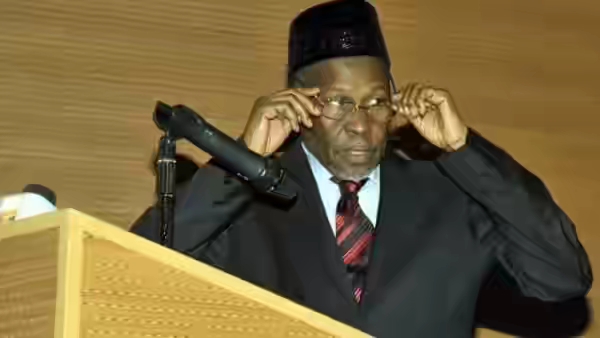The Chief Justice of Nigeria (CJN) Justice Ibrahim Muhammad has advocated alteration of the Constitution to reduce the maximum number of Justices of the Supreme Court from the current 21 to 16.
Justice Muhammad called for an increase in the number of Justices of Court of Appeal, which is currently pegged at 49 in Section 237 of the Constitution, to not less than 100.
He requested the age of anyone to be appointed as a Justice of the Supreme Court should not to be less than 25 years of post-call to Bar.
The CJN also suggested that all the appeals from the Court of Appeal to the Supreme Court should be by leave of the apex court, with an additional requirement that the application for leave could be determined by three Justices of the Supreme Court, sitting in the chambers.
These form part of the 45-point proposals contained in the CJN’s submission on Thursday in Abuja before the Senate Committee on the review of the 1999 Constitution by the CJN on behalf of the Judiciary.
In the 17-page submission, titled: ‘’Input by the Judiciary to the Proposed Alteration to the 1999 Constitution (as Amended),’’, the CJN asked that the Constitution be also amended for the seat of the Secretary of the National Judicial Council (NJC) to be placed at par with that of the Clerk of the National Assembly.
Justice Muhammed requested that the Constitution be further amended to state categorically that the CJN is the head of the Judiciary of the Federation,
He suggested that Section 230 of the Constitution be altered by substitution Paragraph (a) of the existing subsection (2), with a new paragraph (a), to read: “The Chief Justice of Nigeria,who shall be the head of the Judiciary of the federation.”
The CJN further wants Paragraph of the Section to be altered to replace the current provision of: “not exceeding 21,’’ in lines 1 to 2 of paragraph (b) of the existing subsection (2), with ‘’not exceeding 16.’’
The media aide to the CJN, Ahuraka Yusuf Isah, in a statement on Thursday, said Justice Muhammad, in his submission, also asked the National Assembly to alter the Constitution to mandate the National Judicial Council (NJC) to fix and review judges salaries every four years.
In item 38 of his submission, the CJN also requested that Part 1 of the Third Schedule, Paragraph 21 to the Constitution be altered to include sub-paragraph ‘h’ to the effect, that the NJC should ‘’fix, in conjunction with Salaries and Wages Commission, the salaries and other emoluments of judicial staff; in the case of judicial officers, to review such salaries no later than four years from the last exercise.’’
By virtue of the provision of Section 84 (1) of the Constitution, the Revenue Mobilisation Allocation and Fiscal Commission (RMAFC) reviewed judges’ salary by enacting the ’’Certain Political, Public and Judicial Office Holders (Salaries and Allowances, etc.) (Amendment) Act, 2008’’ which came into force on February 1, 2007.
The Act has not been reviewed since it was enacted, leaving judges’ salaries stagnant for about 13 years.
The CJN then requested that the NJC be allowed to collect, control and disburse all monies – capital and recurrent – for the Judiciary.
Justice Muhammad also wants a further alteration to the Constitution to allow the Judiciary to exercise control over the Code of Conduct Tribunal (CCT), and for the Federal Judicial Service Commission (FJSC) to be allowed to advise the NJC in nominating persons for appointment as the Chairman and members of the CCT.












Add Comment